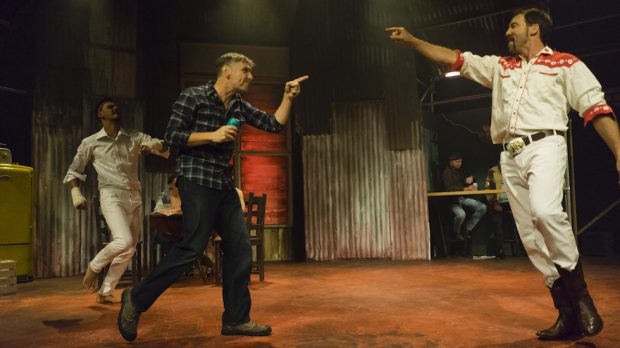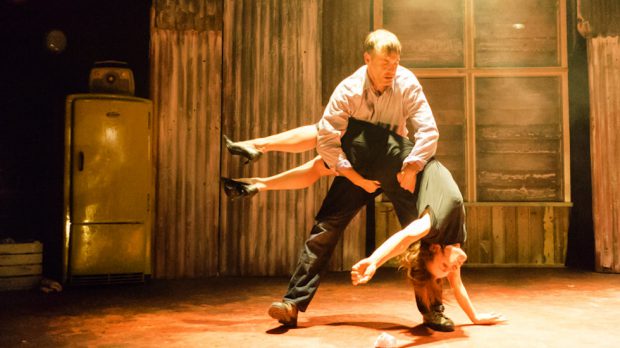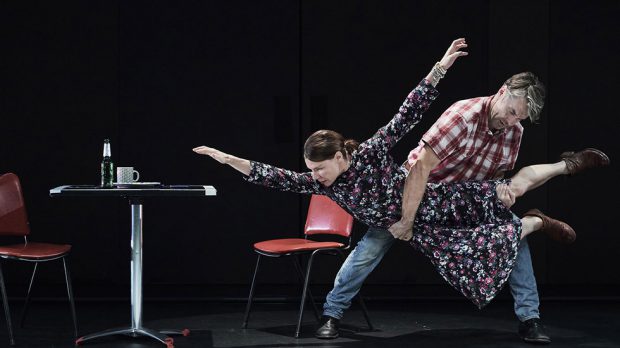
Post Traumatic Stress Disorder not only affects those that suffer from it, but their family and friends as well. The Ochre Contemporary Dance Company’s new production Good Little Soldier is an exploration of this challenge through physical theatre, music and dance. It has been hailed as robust dance theatre, that is physically breathtaking, emotionally engaging and presented by world class performers and follows an acclaimed series of the show in Berlin that brings the production home to situate it vividly in an Australian context.
It’s a deeply personal production for creator and director Mark Howett who has seen the effects of PTSD first-hand as the son of a Vietnam veteran. In this interview he opens up to SARAH PRICE TWIST on why Good Little Soldier was something he had to make. He discusses PTSD from his own journey, more widely in society and its significant meaning to indigenous Australians.
How did you approach this production considering it was so personal to you?
The first thing I did was write a film script. It was really personal, almost autobiographical. I re-read it and realised that it was actually too personal and really it was just a description of my own experience. Then I started working with Gavin Webber and Grayson Millwood who work in physical theatre. I got them to read the script and that lead to conversations about how interesting it would be to explore the subject of PTSD, especially from a sufferer’s point of view.
I’m the son of a Vietnam veteran. So we did use some of my own personal experience as a way to begin working with improvisations. We explored how the family and outsiders see the PTSD sufferer, as well as how the PTSD sufferer sees themselves. Some of the improvs really affected me because I really connected with them. But the more we worked with them, the more we became interested in the symptoms of someone suffering PTSD and how they manifest themselves, especially in the way that they move and think.
The production is essentially a general observation of a PTSD sufferer and focuses on how this issue impacts the family. It’s becoming apparent that PTSD affects more than one generation, it’s multi-generational in fact, so the trauma experienced by the sufferer is actually passed down.

How do you think Indigenous perspectives are weaved into the subject of PTSD?
Indigenous communities have also been experiencing shock, trauma and PTSD over several decades, as far back as settlement. Each generation passes that trauma down. Especially as a lot of the problems have been repeated over the years. Again there is this multi-generational PTSD that’s presenting itself to society now as a consequence of what has been happening over the last 220 years.
How do you think this medium helps open dialog and communicate the ongoing conversation about PTSD?
This is physical theatre, it’s not poetic or aesthetic like dance, it can be hard and tough movement at times. Someone I recently spoke to said that the movement in this production shows the behaviour associated with PTSD, rather than just telling. Through physical movement we’re showing the behaviour of a sufferer and that’s a powerful way of expressing the issue.
You had veterans and their families come in and help, what role did they play?
They helped us find a way of reflecting a community view about the army family. We had some members from Soldier On and Military in Art attend a preview. Even before the end of the preview I knew that we weren’t honouring the soldiers properly within the piece, because I could feel the weight of them behind me.
When we talked afterwards, they wanted to know, for example, if their son is now in the army, how could they possibly give him encouragement when the whole experience was being portrayed as so dark. These questions significantly influenced us. The next day we re-worked a lot of scenes and put two new elements in to address that. They were right. We might be against the politics of why we’d had a war, but we certainly weren’t against the soldiers.

Where did the musical direction come from?
It’s a mirror of our work. On stage we mix genres, we use anything to get across a moment, whether that’s audio visual or using movement or text, and it’s the same with the music. Matthew De La Hunty helped us with the concept. Dale Cooper also shaped the musical direction. He’s actually more of a visual artist, but he currently creates visual art with soundscapes. He uses old electronic equipment to make environments underneath Matthew’s slide guitar to fully communicate each moment.
Does that particular type of music represent what you are trying to say?
Yes. It’s another type of landscape. These sounds in between. We wanted to make an environment where at times it felt empty and the slide guitar helped communicate that or perhaps the scene was really intense and the electronic music directly portrayed that.
Where did you create this particular piece?
We work in a collaborative way. Myself, Gavin and Grayson from The Farm, have been making work for the last 14 years all over the world. I was based in Germany for 12 years and we’ve created a lot of physical theatre work together, as well as touring all over the place. They are just awesome guys to work with. They’ve always been really fantastic collaborators and it’s never been a hassle. Together with Raewyn Hill, who’s the Artistic Director of Co3, we took the work we had done on the show from Berlin, as well as the ideas from making our improvisations and workshops and kept developing it.
We’d talk it out which I feel represents a true collaboration. With so many collaborations, you quickly realise you’re just expected to cooperate with someone, it’s not really a collaboration, they’re just using those words. This work always feels like a friendship, an ongoing relationship. That’s really exciting because we push each other to come up with the best outcomes, which is fantastic fun.

Why do you think it’s important to have this production in Australia on home soil?
We have active servicemen and women coming back everyday. It is the families that wear the social cost when veterans come home. Veterans really do try to hold it in and not let it impact their family, but the trauma is just too great and eventually they let it out. I think that even beginning the discussion about PTSD helps raise awareness. Awareness of mental health is slowly increasing, everyone knows how bad it can be, and our governments are trying to help. But if there’s a greater awareness throughout society then there’s more chance of the community intervening and helping earlier so that it doesn’t become so drastic.
How do you think this show will raise awareness?
By making connections. For example, having a Military in Art exhibition downstairs in the theatre lobby means we’re interacting with the community that we’re talking about. It’s all very well that I’m the son of a veteran, but it’s important that we connect with this community that we’re telling stories about, that we’re relating to them. Our connections with community members and organisations make sure that the information gets out there. The more people that become aware of the issue then the more impact it has.

Having lived overseas and travelled with a lot of your shows, how do you feel the Perth creative scene compares to those elsewhere?
I think we’re as good as everyone else and that the problem lies in comparing rather than making. I’ve worked on productions at home in Perth that are as good as anywhere and I’ve worked in an awful lot of places. I’ve had 12 shows on the West End, I’ve worked with drama companies worldwide, and the National Theatre, and all through Europe, and with several of the major companies. I still think we’re as good as anyone else. It’s just focusing on trying to encourage that, rather than comparing.
How can we do that?
A really important way of doing that is by telling stories from where you are and what’s around you. I think that then other cultures and communities become interested, because you’re telling stories from your place. That’s certainly the direction we’re moving in. I’m very happy to come home to Perth. It’s incredible that we can work in collaborations that are world class and that we can do it from home in WA. That’s really important. We have so much potential to make great work. It’s part of the reason I came home instead of being based in Europe. It’s turned out so well. It feels good to come back and contribute to the place that really helped me when I was young. Working in the arts has given me a fantastic life and I’m honoured to have travelled the world during my career to work on awesome projects that are so varied.
Don’t miss Good Little Soldier at the Subiaco Arts Centre at 5.30 pm and 7.30 pm from Wednesday July 26 – Sunday July 30. Get you tickets here.
Photos by Peter Tea